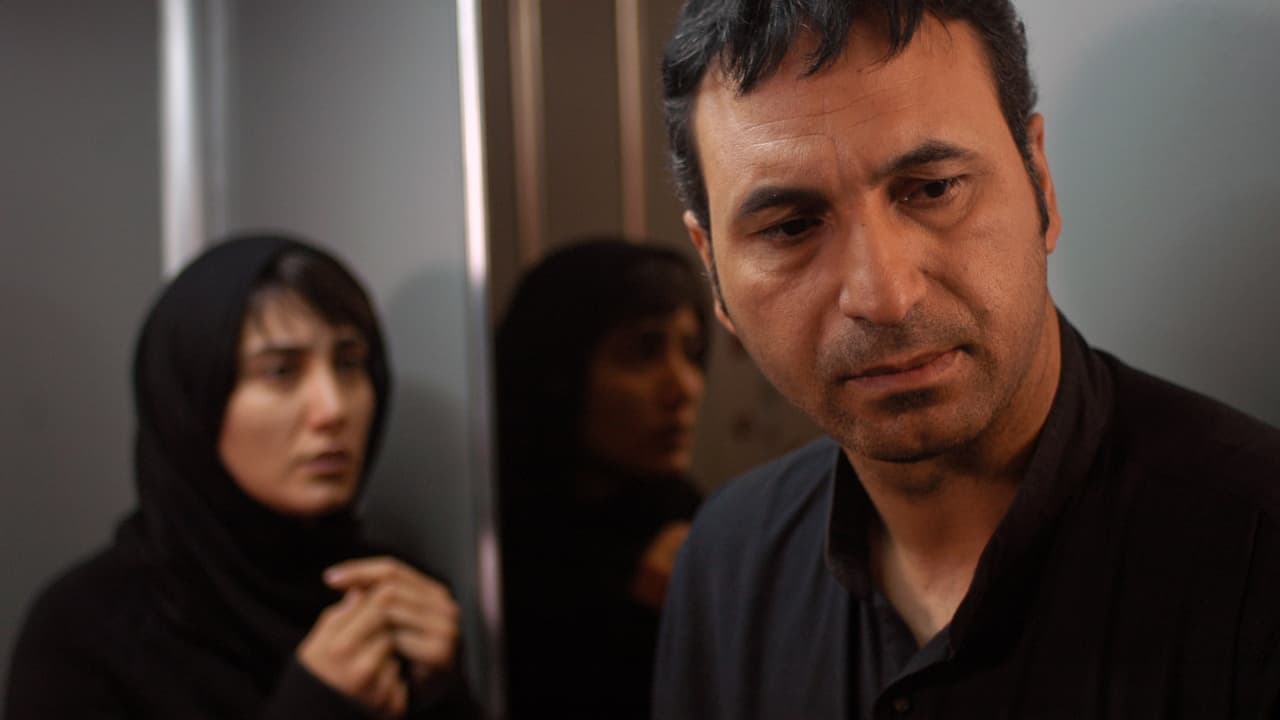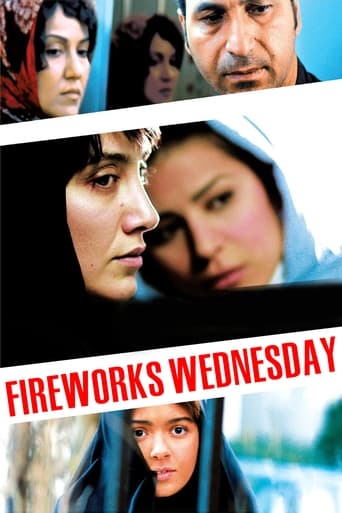

Fireworks Wednesday is celebrated Iranian director Asghar Farhadi's 2006 film that finally saw the light of day here in the US ten years later following a DVD release. Here Farhadi is both director and co-screenwriter, exploring marital discord between a middle-class couple on a Wednesday eve right before the Iranian New Year (outside a plethora of fireworks are exploding all over the city). The warring couple is wife Mozhdeh and husband Morteza Samiei; they have a young son, Amir-Ali who can't help be affected by the terrible tension between his parents. Morteza wants the apartment cleaned as the family was initially planning to take a trip to Dubai the next day (which never comes to fruition). He hires a maid, Rouhi, to clean the apartment, against Mozhdeh's wishes. Rouhi, is a virtual innocent compared to the Samieis, as she is soon to be married and has a cheerful disposition. Her working-class origins are succinctly contrasted with those of the middle-class Samieis (perhaps Farhadi is emulating Bergman's Persona, the 1966 face-off between a mentally ill actress and her more well-adjusted nurse, charged with taking care of her). Fireworks Wednesday has a rather slow-moving plot but the central question keeps us interested: is Morteza cheating on Mozhdeh with their divorced neighbor, Simin, who runs an illegal beauty salon in their apartment building? Mozhdeh conscripts Rouhi to spy on Simin and learns from her that both her husband and the neighbor won't be home until 5PM. Her suspicions about the affair virtually confirmed, Mozhdeh then has Rouhi pick up Amir-Ali at school and goes off to spy on her husband; after he finds out, he publicly beats her and she's ready to take her son and move in with her sister and brother-in-law. All hell breaks out in the apartment with Mozhdeh accusing her husband of the affair. It's the level-headed Rouhi who lied about how Simin knew of the Samieis' departure time to Dubai (she presents an alternative explanation), calming Mozhdeh and preventing her from leaving. There are more surprises here but keep in mind, as previously mentioned, it takes quite a bit of time to get to the big payoff. SUPER SPOILERS AHEAD. Yes it's Farhadi who teases us into believing that the wife is unstable and paranoid. But ultimately he reveals to the audience that indeed Morteza has been having an affair with Simin. The next twist is Simin wants out of the affair. And finally Rouhi figures out that Morteza is guilty as sin (she can smell his perfume-the same given to her by Simin during her beauty salon session there earlier). Again, it's the level-headed Rouhi who prevents further heartache by not confirming Mozhdeh's deeply held belief about her husband (which now happens to be true). Farhadi follows in the path of the earlier master Bergman, suggesting that the unhappy couple will continue to soldier on, despite the husband's infidelity. The performances here by stars Hedyeh Tehrani (Mozhdeh), Taraneh Alidousti (Rouhi), and Hamid Farokhnezhad (Morteza), are impeccable. While the dissection of marital infidelity is not the most original idea for a film, it's presented with great verisimilitude with enough surprises to keep our interest.
... View MoreI watched this film with a mixed group of people, some Iranians, some non-Iranians who had seen many Iranian films and some who had never seen an Iranian film before.The ones who had never seen an Iranian film were amazed, thinking this is the greatest thing sine sliced bread. The rest merely liked the film. The first group was shocked by how good this thing is, probably unaware that Iran makes actual films (maybe thinking Iran just makes anti-US films?), but what amazed them is how real the story felt like and how different it is from anything they had seen before.Yes, Iranian films are very realistic because they chose subjects that are not implausible to begin with. It's not difficult for Iranians to act roles of husband, wife, child, father, son, roles they actually play in real life. What's more difficult is to act roles they don't play in real life - Sassanian knight, medieval poet, secret agent, drug dealer, prisoner, etc. This film's originality is because there are few Hollywood films (or even world films) like it. In that sense it is quite original. In another sense, it is very Iranian and there are quite a few Iranian films like it.This movie is a slice of life into the lives of a married couple through the eyes of a cleaning lady who they also use for errands, as a babysitter, as a spy and as an alibi. She is a poor, simple and rural girl, and thorough her innocent eyes we see the lives of the upper middle class, how their financial security does not save them from living in a personal hell. It is a slice-of-life film taking place in a 16 hour period, a story that drops you gob smack in the middle of the story and leaves you without an ending. That is my biggest problem with the film. I have no problem with a slice-of-life stories. I really love them. I have no particular problem with stories that don't have proper beginnings, that just start in the middle letting your brain connect the threads together, arranging the pieces of the puzzle as you get new bits of information. I actually think that this may be a better approach than an exposition at the start of the film - such as an introductory text, or overhearing a conversation that sets up the story in its entirety, i.e. something like "I think my husband is having an affair. I think it's the neighbor. I saw her number on our caller ID. Someone heard his voice on her answering machine. He also smells like a woman's perfume. Could you please spy on her for me?" That's a terrible way to start a film. I'm also neutral on stories without a clear-cut ending. Or a story without a central character. But films like this are unsatisfying. No beginning and no ending is a bit too much for me. It's as if you went to your friends house, a married couple, watched them fight for a few hours, get dragged into it, provide an alibi, and then leave. That's the movie. Of course, there's more to it than that. This movie is a window into Iran, into the Iranian middle- class, into married life in general, into Tehran and into Newrouz. In 100 minutes, we get to see through this window into a country, a social class, a building, a nuclear family, a city and a festival. But we don't get to see a story. We overhear a story, we catch a glimpse of it, like seeing a couple fight in a restaurant. If you're there long enough, you'll hear the entire history of the couple, along with the lists of mistakes each of them has done, but you won't hear a conclusion. Contrast this with About Elly, which is also a slice-of-life film, but has a clear beginning and end.The lack of conclusion is not the only flaw with this film. It's that this kind of film is not really original for Iran. Someone listening to a jazz song for the first time might think it's completely new, but when you hear more and more you realize that that piece may not have been all that original after all.I want to see Iranian filmmakers challenge themselves, try to do something that is not just uncommon for world cinema, but uncommon even for Iranian cinema. There are other weaknesses in this film - the music - the traditional music during the day festivities was good, the bandari songs played during the night festivities were good too, but the soundtrack (played during dramatic scenes) was not good. It was too loud and just not one of the better things from Iranian music. Iran has a rich history of music but there's a big disconnect between Iranian musicians and filmmakers. The only films that have great music are ones about musicians it seems.Other than that, everything was excellent. Cinematography is brilliant. There are two scenes that stand out, Simin walking on the street and the car ride during Newrouz. A must watch for cinematography fans and film students. Everything felt realistic. You never feel like anyone is acting. It feels more like a documentary than a stage play, which is a good thing. It is a good film, but not really a must-watch.
... View MoreOne of the best Iranian movies ever! chaharshanbe-soori is about love,family and truth.Mojde,a housewife,suspects his husband of having affair with a woman next door.A young girl who is going to get married comes to their home for cleaning and gets involved in their problem.Like people who are watching the movie,she thinks the husband is innocent and helps him to win the fight against his wife.All these events, take place in chaharshanbe-soori,an old Iranian ceremony.Movie has got excellent acting,Hedie Tehrani is unforgettable,and excellent directing by Asghar Farhadi.One of those movies that stick in your mind for ever!
... View MoreIf we have two or three of such movies per year, that will be more than enough for our society to break down. One of the best Iranian traditions, Chaharshanbe-soori, has been shown like a dangerous street riot throughout the film and the sound of explosions is heard in all scenes. Is this really all we have in "Chaharshanbe-soori"? The house cleaner "Roohi" does nothing but eavesdropping, lying and interfering in Mojde's private life and goes happy with her fiancé at the end with no punishment for her behavior. The worst part is that the hairdresser "Simin" who is the cause of this entire scenario (beside Morteza of course) appears as an angle requesting an end to her affair with Morteza because Mojde is under intense pressure due to their relationship (as she says)!!!! So real!!! If this angel really has a heart like this why has she started this affair not thinking about Mojde but her little son who may lose either his father or mother as a result of her joy (mentioning that Simin herself has a son who is experiencing a different life because of separation of his parents). While the only positive point of the movie is that apology that Morteza gives to her wife because of his behavior in the street, Morteza believes that he has the right to cheat on his wife because she is a terrible housewife (Morteza: go and ask neighbors to see when has been the last time that they have smelled food from our home?); as no where in the movie this idea is denied, it seems to be the final belief delivered to the viewer, but is this really the solution???...
... View More